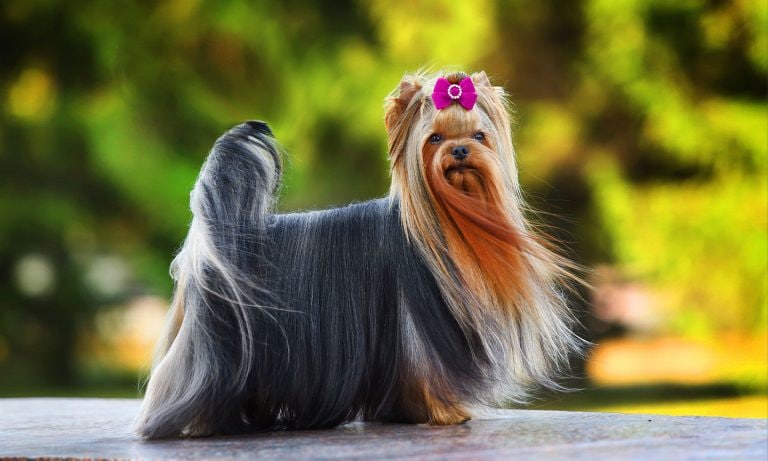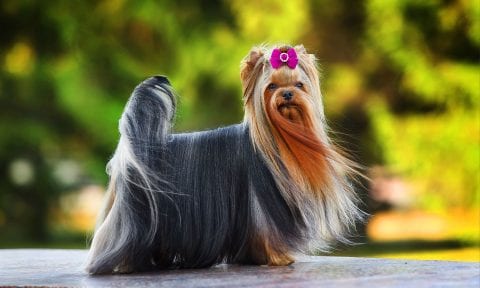Yorkshire Terrier vs Chihuahua

Breed Snapshot
Best For
The Yorkshire Terrier, affectionately known as the Yorkie, is a small yet spirited toy breed cherished for their long, silky coat and confident demeanor. A popular companion dog, the Yorkie is intelligent, loyal and packs...
The Yorkshire Terrier, affectionately known as the Yorkie, is a small yet spirited toy breed cherished for their long, silky coat and confident demeanor. A popular companion dog, the Yorkie is intelligent, loyal and packs a lot of attitude in a lapdog body.
Yorkshire Terrier Temperament
Though small and cute with flowing locks, the Yorkshire Terrier is a smart, spunky dog who isn’t aware of their diminutive stature. Originally bred to hunt rodents before becoming popular as lapdogs, the Yorkie retains much of that tough terrier ‘tude (and bark) today. These confident pups might jus...
Though small and cute with flowing locks, the Yorkshire Terrier is a smart, spunky dog who isn’t aware of their diminutive stature. Originally bred to hunt rodents before becoming popular as lapdogs, the Yorkie retains much of that tough terrier ‘tude (and bark) today. These confident pups might just take full command of the household if you let them, not-so-gently letting you know when it’s time to wake up, put the food out and go for a walk.
Fortunately, this smart breed is eager to please, making them a quick study when it comes to dog training. With early training and plenty of opportunities for social interactions with humans and canines from a young age, Yorkies can be a loyal, playful and friendly best bud. However, they aren’t great with young kids and babies—or, rather, young children aren’t great with them, especially those who like to play rough and haven’t been taught how to respect a dog’s boundaries. As with any dog, be sure to supervise encounters to ensure a safe and positive playtime.
Yorkshire Terriers don’t mind being handled and carried, so they’re some of the most portable pups around. But be careful not to coddle them too much. Yorkshire Terriers still need exercise and independence so that they don’t grow afraid to be out of your arms. In fact, because Yorkies bond so closely with their people, many Yorkie parents get two so they can keep each other company.
Yorkshire Terrier Traits

Breed Snapshot
Best For
Equal parts affectionate, charming and mischievous, Chihuahuas are small, adaptable dogs who thrive in households (small and large!) with no other dominant pets. This toy breed's ideal pet parent provides companionship, care and lots of...
Equal parts affectionate, charming and mischievous, Chihuahuas are small, adaptable dogs who thrive in households (small and large!) with no other dominant pets. This toy breed's ideal pet parent provides companionship, care and lots of attention.
Chihuahua Temperament
Chihuahuas are charming little scamps with an eye for mischief and a sense of bravery that outsizes their physicality. They’re playful pups who enjoy a good romp or game, even though it may not last long (depending on their energy level). And they love to snooze on laps an...
Chihuahuas are charming little scamps with an eye for mischief and a sense of bravery that outsizes their physicality. They’re playful pups who enjoy a good romp or game, even though it may not last long (depending on their energy level). And they love to snooze on laps and cuddle—that is, after all, what they’re bred to do.
They like a lot of attention and are quite portable. But even though they’re easily carried, they do still need to learn how to walk on their own and be able to engage in normal dog behaviors, like sniffing, exploring and playing. In other words, don’t pop them in a purse or a stroller and tote them everywhere—unless, of course, it’s somewhere risky with lots of feet that could hurt a tiny paw, like an airport or street festival.
The Chihuahua dog breed is said to resemble a terrier with their demeanor and can become quite feisty, especially if they feel threatened. Some sites report that the Chihuahua bite force is 3,900 pounds per square inch (psi), but those so-called Chihuahua facts are wildly inaccurate, when a lion is only at 600 psi. In truth, Chihuahuas usually inflict no more than a Level 1-3 bite, with no puncture deeper than half the length of one of their canine teeth.
To help your Chihuahua puppy overcome a nipping or protective tendency, socialize them by safely and slowly introducing them to new people and places from the get-go and start training when they are young. Early training will also help this smallest of dog breeds become wonderfully friendly and receptive to all members of the family, including other pets.




